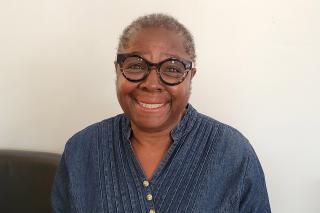In her new book co-authored with Tracy L. Robinson-Wood, Sister Resisters: Mentoring Black Women on Campus (Cambridge: Harvard Education Press, 2022), Professor Janie Victoria Ward uncovers strategies of resistance that empower young women and their mentors. She and her co-author discussed their book on WBUR FM Radio Boston on September 21.
How did this book come about?
I met the co-author of our book, Tracy L. Robinson-Wood, when we were young doctoral students at Harvard's Graduate School of Education. We often discussed our experiences in and outside of class, particularly our difficulties with securing internships and research projects. We found that we did not have much mentoring. We seldom encountered researchers who look like us, and there were very few Black women, or women in general, who could talk about the challenges of being Black and female in the academy and help us navigate our careers.
My co-author and I have been writing about the concept of resistance for a very long time. In fact, our first article came out when we had just finished graduate school. We wrote about how Black women learn to respect our legacies of resistance. Because people continue to demean our value and underestimate our abilities, Black women have learned to push back against such negative assessments. Moreover, we have learned to stand up for those attitudes and behaviors that are culturally and self-affirming, future oriented and socially just.
I went on to study adolescent development and Black parenting practices, specifically how resistance is taught and supported in Black families. In this new book, we turn to resistance and mentoring at the college level. Tracy and I start the book by talking about our mentoring experiences in college and graduate school. We both conclude that had mentors with knowledge about gendered racism been in our lives, things might have been different for us. Fortunately, we did have each other; traditionally Black women in the academy tend to lean on one another for support and guidance. But we ask the question, what would it mean for young women of color to have mentors who are wiser and more experienced, and are also skilled at providing important feedback around navigating gendered racism in college and later in one's career?
The title is Sister Resisters because we discuss the fact that when it comes to the mentoring of Black (and other BIPOC) students in primarily white institutions, most often White women are working in these roles. Aside from faculty and administrators, many counseling and student affairs professionals in allied services such as admissions, financial aid and career development, are White women, and often these positions involve formal or informal mentoring. Thus the "sisters" we refer to in our book are white women. We argue that White mentors, while appreciating how resistance strengthens young black women's lives, can examine how they have had to resist devaluation in their own lives—economic bias, ability bias, gender bias. We talk about how white women can use such knowledge to build meaningful cross-racial mentoring relationships and collaborate with young Black women to design resistance strategies that are appropriate, effective and within their control.
What was the research process like?
My co-author and I have been working on the concept of resistance since the late 1980s. Over the years, we have refined those ideas. For instance, I wrote a book entitled The Skin We're In: Teaching Our Teens to be Emotionally Strong, Socially Smart and Spiritually Connected, which is about preparing teenagers for the racial realities that exist.
In this new book, we've added case studies and vignettes gleaned from our own research as well as additional interdisciplinary research on diverse college aged students, including insights from psychology, sociology, the humanities, and beyond.
What are some of your key findings?
There is a lot of talk about race in America, but often these discussions happen after an emotionally charged incident has occurred, such as the death of George Floyd in 2020. Yet these issues do not go away just because a discussion has ended. And often college students of color would like these conversations to continue, yet professors are ready to move on.
We argue that if you want to have a strong cross-racial mentoring relationship, you have to do some real and honest relational work. In other words, you need to find ways to truly connect within the relationship. You must be a good listener. Developing trust and enhancing our communication skills is essential when mentoring Black women. We tend to assume that the senior, more educated and experienced mentor will necessarily possess more knowledge than her junior mentee. However, when you are dealing with racial matters, the mentee may be the one in the relationship who knows more than the mentor about how race works in America. Because these dynamics are flipped, it is so important for white mentors to hear from their Black mentees directly about their lived experiences on campus, and help them craft resistance strategies that work for their institution.
What impact do you envision the book will have?
I am hoping that women in particular — and note that we can have brother resisters too — might bridge some of the relational divides that exist between White women and Black women. I hope that our book helps to reduce these gaps by inviting white women into the circle. Women may find that they are dealing with similar, overlapping issues of concern in their institutions. Perhaps together they can do the relational work that brings us together and moves us forward.

